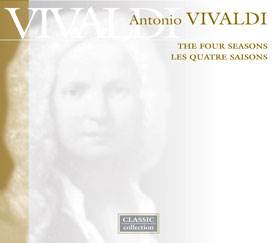In a crowded
market, any recording of Vivaldi's 'The Four Seasons' must possess
some essential qualities to make the recording worth listening to.
This recording, by the Slovak Chamber Orchestra under Bohdan Warchal,
was originally issued by Opus in 1989. Even then, it must have seemed
rather old-fashioned. The orchestra play on modern instruments but
only seem intermittently interested in the issues facing such groups
in the light of our vastly increased knowledge of period performance.
The
recording was made in an over resonant acoustic, but the orchestra
play in a crisp and lively fashion. The opening Allegro of 'Spring'
mars this promising impression by proceeding in a rather dull,
deliberate fashion with the harpsichord tinkling in the background
in a very embarrassed manner. The 'Largo' is very polite with
no dogs barking in the violas. These performances, generally,
seem to lack a feeling for the narrative underlying the concerti.
In the finale, the violinistís tone turns pinched and thin, with
the accompaniment rarely rising from a feeling of routine.
The
recording comes with no notes and does not reveal whether Bohdan
Warchal is the conductor and/or the violinist. Whoever is playing
the solos has a generally fine technique, but not such a good
feeling for the style of the works.
The
opening of the second concerto, Summer, is done in a very hushed,
romantic manner. This is not a bad thing in itself, but the movement
develops with little sense of excitement. In the middle movement,
the bass interruptions are overly loud and lack any sense of menace.
In the closing 'Presto', the combination of instruments and acoustic
starts to tell as the textures get rather thick. The soloists'
tone suffers in this movement as well and the overall effect is
stolid and steady.
This
steadiness is fatal in opening Allegro of 'Autumn' and in the
Adagio the romantic string sound was just too out of place for
me. In the concluding Allegro, the string accompaniment was just
too heavy and lumbering.
The
final concerto, 'Winter', shows that the performers could make
the concerti work. The opening of the first movement was most
effective and the Largo was simply lovely.
The
disc concludes with two other Vivaldi concerti, both with unnamed
soloists. The Flute concerto, 'Il Gardellino', benefits from a
flautist with a sweet tone and easy facility with the attractive
solo part. Unfortunately the tendency to steady tempi robs the
performance of its effectiveness.
The
final concerto, for two trumpets, provides excitement with the
soloists displaying a fine technique and brilliant sound. I find
that this concerto can sound a little too insistent when played
at modern pitch on modern instruments, and so it was here. The
accompaniment unfortunately does not match the soloists and proceeds
in a predictably steady manner.
I
mentioned at the beginning that a recording of these works must
have some individual qualities. Unfortunately I cannot really
say that I found much in this recording for me to return to. Whilst
there are a number of highly recommendable versions of these works
on original instruments, the situation on modern instruments is
more varied, so it is rather difficult to make a recommendation.
Many fine violinists have been tempted into 'having a go' with
variable results, some groups applying a sense of period style,
others not. If you can face the expense, then Kyung Wha Chung's
recent version with the St. Luke's Chamber Orchestra on EMI is
highly recommendable. For a cheaper option, then do try the Academy
of St. Martin in the Fields under Neville Marriner with Alan Loveday
as fresh and stylish soloist, available on mid-price on Decca.
Robert
Hugill
